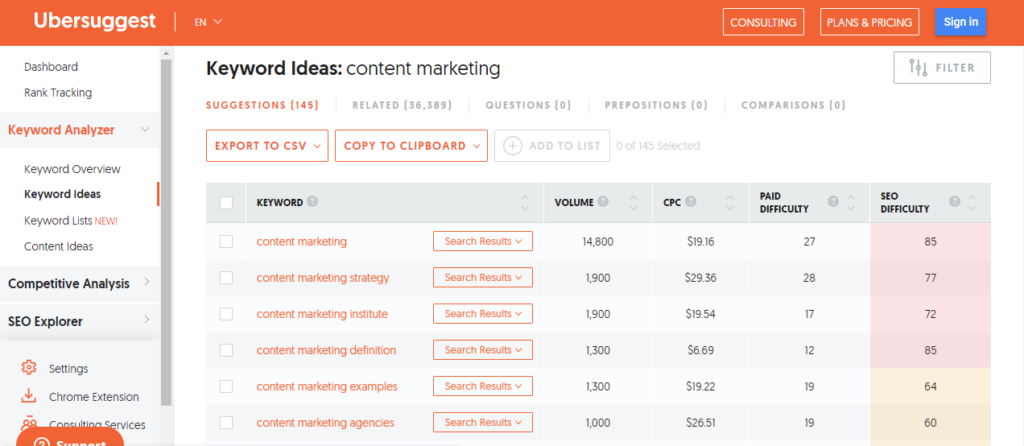Coming up with new blog topic ideas can be one of the biggest challenges to consistently publishing new and engaging blog content. But stats show that businesses who blog regularly and consistently are more likely to achieve the benefits of blogging.
The good news is that there are some really easy ways to gather a heap of blog topic ideas to inspire your editorial calendar. And probably your social media posts and other content formats too. In this article I have pulled together a list of places you can go to when you next need inspiration for your blog. These seven sources of blog topic ideas are:
- Your frequently asked questions
- Asking your audience
- Answer the Public search listening tool
- HubSpot topic generator
- Online forums
- Keyword data analysis tools
- My list of powerful blog topic prompts – specifically tailored to business consultants, Virtual Assistants and B2B professional service providers
Don’t forget your audience…
When you start diving into some of the cool tools out there it can be easy to compile a huge list of possible blog topics ideas and then dive headfirst into writing your next article. But don’t forget, the heart of your blog is your target audience.
Just because keyword data tells you Tik Tok is a hot search topic right now, doesn’t mean YOUR audience are interested in that. Or it might not mean your audience is interested in hearing about that FROM YOU. Keep your target audience – and the problems you want to be known for solving – always at the centre of your topic selection.
And, a popular topic alone does not make your article compelling. It still needs to be written well, structured for easy consumption, and engaging. Make smart use of headers, bullet points/lists, quotes, images, and storytelling to make your article enjoyable to read and easy to digest.
If you use one of the tools below that provide suggestions by aggregating search/keyword data, keep in mind that your article will be competing for space against all the other articles out there on that topic. Write for your specific niche and for your specific target audience. Give them something they won’t find anywhere else – based on your experience, expertise, insights and opinions.
Keeping these points in mind, here are my recommended sources for blog topic ideas next time you are in need of some inspiration:
1. Frequently Asked Questions (FAQs)
What questions are people asking you?
Everyday you are interacting with clients, potential clients, and people in your business network. Chances are, some questions or conversations tend to crop up quite regularly. One of the best sources of inspiration is the questions and topics you get asked about the most.
Many of the questions you get asked will be about your area of expertise. But don’t forget about those questions related to your process, your solutions, and the experience of working with you. Articles that help your target audience understand what they need to do or think about when engaging with someone in your industry can help them feel more confident and comfortable in taking that step towards purchase.
You might even have a list of FAQs on your website already. You can take one of these questions and dive into it in more detail for your next blog article. Or maybe bundle a few related questions together in an article that provides “answers to common questions about X”
If people are already asking about it, make it really easy for them to find your answer!
2. Ask your audience
Have you asked your audience what they would like to learn about or hear about from you?
There are some simple ways to gather input directly from your audience.
- Create a short survey that you share via your socials and email list
- Create a poll in your Facebook group
- Post an Instagram story and use the Ask Questions sticker
- Add a question to your off-boarding/project wrap up questionnaire

If you already have a shortlist and are looking for your audience’s preferences, then something like a poll works well. These are likely to get better engagement because there is less thinking for your audience to do. But if you want to start with a clean slate you would be better off using the Ask Questions sticker.
You can also look at different ways to frame the question, not just asking directly what blog topics they want you to write about. Answers to the questions below would give you great insight into valuable blog topics, as well as fuel for your marketing copy and other content:
- What would you like to learn more about when it comes to X?
- What is your number one challenge with X right now?
- If you could change one thing about X, what would it be?
- Which is more important to you right now: X or Y?
3. Answer the Public
Answer the Public is described as a ‘search listening tool’. It taps into the search autocomplete function. You know the suggested search terms that automatically popup when you start typing something into a search bar? Answer the Public takes data from those autocomplete terms and tells you what the most popular search terms are for your chosen keyword or phrase.
The results are displayed in a really cool spiral type graph. You can see an example below for the term “content marketing”.

Answer the Public is a great way to get insight into what people are searching for in real time – what they want to know about right now. This can help you narrow in on the topics that are most popular and timely. You can also click on the results to see what content ranks most highly for each search phrase. This can give you an insight into what other people have covered and where there might be gaps.
While Answer the Public can guide you towards popular topics, remember to write for your target audience and address their specific concerns, needs, challenges related to the topic.
4. HubSpot topic generator

This handy little tool draws on Hubspot’s database of successful headlines. You put in the topic you want to write about. It gives you back a bunch of suggested blog topic ideas in the format of a headline. You can get five suggestions straight away, or sign up to their mailing list to get the full list of 250 topic ideas.
The generator works by simply substituting your topic into its headline templates. So sometimes the headline doesn’t really make sense or the grammar is a bit off. But if you look past this they can still have value in triggering some inspiration.
There is heavy representation of ‘listicles’ (articles which are formatted as a list of points). I think this accurately represents the popularity and success of this format. Some of the headlines come across as a bit cheesy or sensationalist, but again, this represents the kind of headlines that grab attention.
With such an extensive list of headlines, you are bound to find some that you have not thought of before and could inspire your most popular article yet!
5. Online Forums
Online forums are a fantastic way to canvas a broader audience you might not be able to reach directly. They can take the form of Q&A boards (like Quora), discussion forums (like Reddit), online communities (like Flying Solo) or Facebook groups.
The challenge with forums like Quora and Reddit is that it can be time consuming to find the communities, sub groups and threads that are relevant to your business and your audience. You might also have to wade through a bunch of misinformation and spam.
Facebook Groups and online communities can be more intimate than the large scale online forums. And more directly relevant to you and your audience. So it is important that you take the right approach to developing relationships and connections. Don’t just drop in to them to get what you want and then ghost. Be an active participant, interact and get involved. You will get a lot more out of it this way.
6. Keyword data
Keywords – the holy grail of SEO!
A few years ago SEO and blog articles were so tightly bound together. But writing for SEO put too much emphasis on what Google thought of your article. And this took too much focus away from what your human audience wanted to read.
So now the advice is to write for your audience first, but then chuck an SEO lens over it to make sure you aren’t missing opportunities to rank better.
SEO as a marketing tactic is still incredibly important and powerful – but it compliments your blog rather than drives it. That said, the amount of data available about the volume of searches for keywords can give some useful insights into search behaviour and what people want to know about. As well as how much and what kind of content already exists in that space.
A keyword tool that I like is UberSuggest. Here is a screenshot of the results for the keywords “content marketing”.

This tells me that lots of people search for content marketing, but it is also very competitive so it will be challenging for me to rank highly. A more attractive topic might be “content marketing examples”. It still has a high volume of searches but is not as competitive.
Once you have some high level keywords you can combine them with your niche and characteristics of your target audience to refine your topic into something relevant to your readers.
7. My list of 64 powerful blog topic ideas
I have included my resource because I curated this list of blog topics specifically for business consultants, coaches, VAs and other professional services businesses.

The prompts I included in this list come from my own experience working with clients in the B2B services sector, as well as picking the best of the crop from some of the tools above. They are geared towards demonstrating expertise, sharing experience and helping grow your know+like+trust factor with your audience.
If you want to download the list of 64 powerful blog topic prompts for biz consultants, VAs and professional services you can grab it here
So there you have it – seven places you can go to find inspiration for your next blog article. The best inspiration comes from as close to your target audience as possible – your FAQs and just asking them what they need help with it. But you can use some really cool tools that tap into search data and can help you find topics that are good for SEO as well.
With all these topic suggestions you should be able to easily fill your editorial calendar for the next year or more, with topics leftover to use for social media posts and other marketing channels.
If you are working on your editorial calendar and want to chat about ways to boost your blog so it is positioning you as the go-to expert in your field, book in for a free chat.



